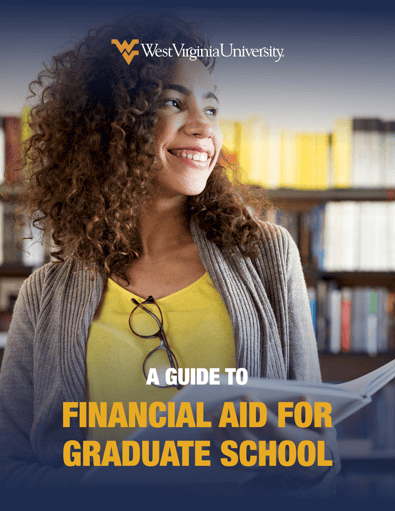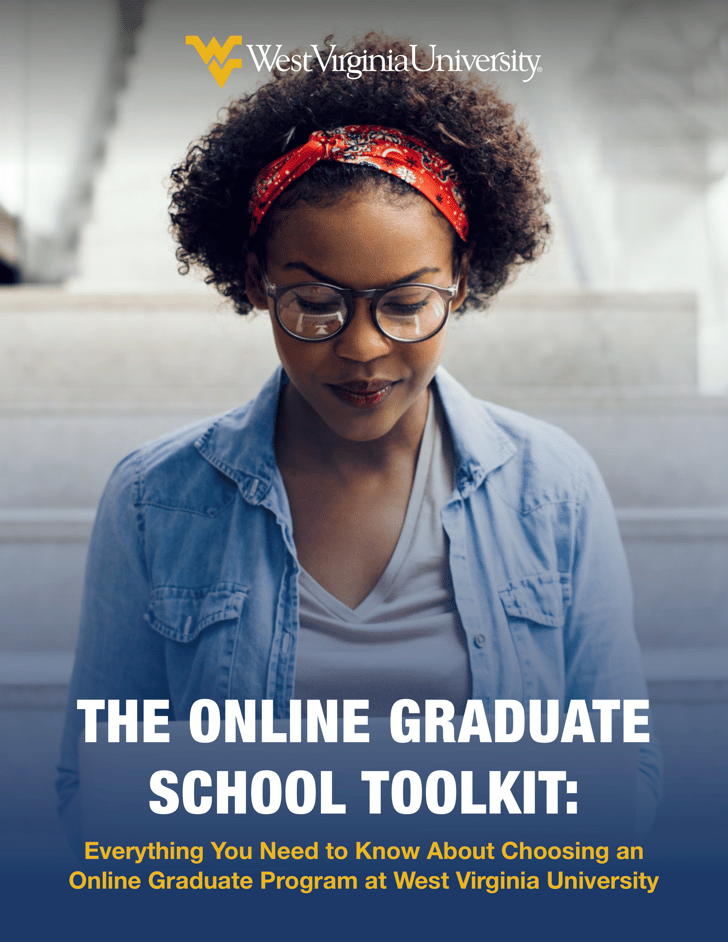What is Literacy Education?
As an educator, as an agent of change, it’s crucial that you cultivate the skills needed to teach students valuable lessons — both inside the classroom and beyond. In particular, literacy educators are uniquely qualified to perpetuate the growth of life-changing skills — like reading, writing, and communicating — needed to empower students to challenge conventional thinking, increase self-awareness, and impact social change.
Literacy education, as a discipline, is a field of study that equips educators with the practical knowledge and the strategic tools to effectively teach students how to read, write, listen, speak, research, and observe in order to positively impact the future generation of literacy-rich and confident leaders. By pursuing a Master of Arts in Literacy Education and by attaching a Reading Specialist Certificate to that advanced field of study, you’ll position yourself as a leader in the field of education and more importantly, equip yourself as a service-oriented changemaker that’s ready to enact positive change in the lives of students and communities.
Needs in Education:
West Virginia and Beyond

Budget cuts, overcrowded classrooms, lack of food security, school violence, teacher turnover, an ongoing immigration crisis — America’s education system is vulnerable for these reasons and so many more. While America’s school system as a whole is facing these challenges, the state of West Virginia is particularly challenged in very specific ways: The U.S. Department of Education list shows teacher shortages in schools in 32 West Virginia counties, including Marion, Monongalia, Preston, and Randolph. In light of West Virginia’s teacher shortage, the state is very much in need of qualified, intelligent, and empathetic educators who can teach life-changing skills to students of all ages.
Educators, and specifically specialized literacy professionals, are uniquely positioned to transform the lives of students because they are strategically taught to empower students to effectively harness the power of literacy-related skills and to use those skills both inside and outside the classroom. In order to effectively provide these tools to students, literacy educators need to arm themselves with a graduate degree that has coursework designed to prepare specialized reading professionals in the three key areas identified by the International Literacy Association: read, write, and communicate.
Specialized literacy professionals, armed with a graduate degree in literacy education, can use their advanced degree to distinguish themselves from the pack of teachers who have a generic education background. With the Reading Specialist Certificate stamp of approval on your resume, employers all over the country know that they are hiring someone with the deep knowledge needed to improve the lives of students and ultimately, the field of education as a whole.
Request More Information
If you have questions about what it would mean for you to pursue the Literacy Education graduate degree at WVU, we encourage you to request more information today!
Request More Information
Literacy Education
Careers & Salaries
What can you do with a graduate degree in literacy education? Students who graduate with a master’s degree in literacy education and who hold a reading specialist certificate will be prepared for the following careers. These are only a few examples of some of the many opportunities that will be open to you with this degree. Advanced degrees or certifications may be required for some positions.
-
Interventionist — Projected Job Growth | 8%
-
Literacy Coach — Projected Job Growth | 10-14%
-
Elementary School Teacher — Projected Job Growth | 5-9%
-
Middle School Teacher — Projected Job Growth | 5-9%
-
Education Professor — Projected Job Growth | 10-14%
-
Instructional Coordinator — Projected Job Growth | 10-14%
-
Tutor — Projected Job Growth | 10-14%
-
Academic Coach — Projected Job Growth | 13%
-
Education Administrator — Projected Job Growth | 5-9%
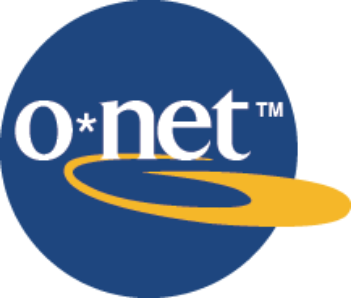
Note: Information about careers on this list comes from the Occupational Information Network (O*NET) of the U.S. Department of Labor/Employment and Training Administration (USDOL/ETA).
The Bureau of Labor Statistics predicts teaching-related professions will grow at a rate of approximately 8 percent between 2016 and 2026, about the same as the national average. In 2016, the United States had millions of teaching jobs, including more than 1 million in high school, 1.5 million elementary school teachers and 630,000 in middle school. The median salaries for graduates who hold a master’s in literacy education are:
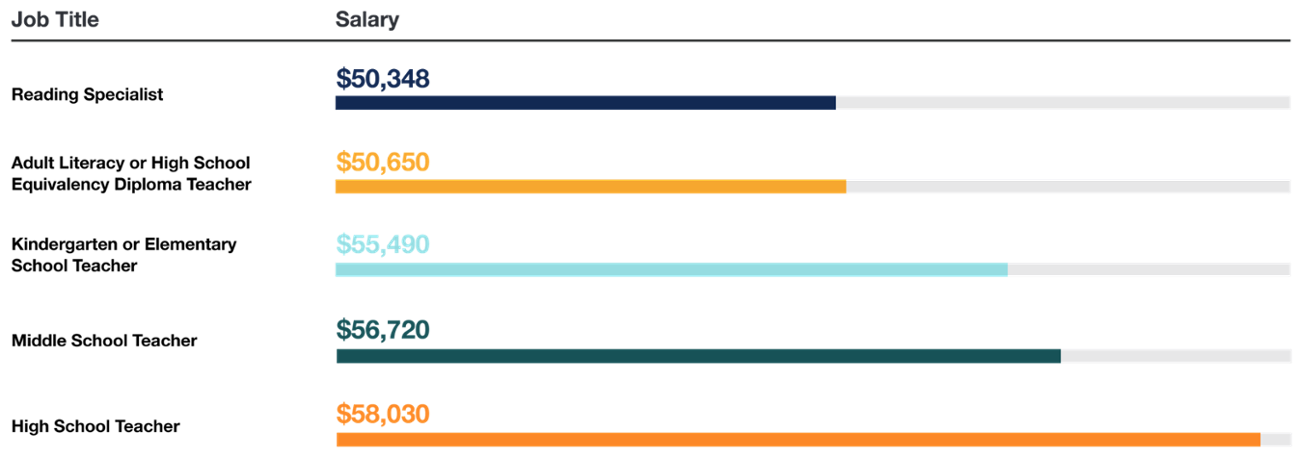
DOWNLOAD THE GUIDE
A Guide to Literacy For Educators Seeking a Reading Specialist Certification
Literacy educators, armed with a graduate degree in Literacy Education, can use their advanced degree to distinguish themselves from the pack of teachers who have a generic education background. And with the Reading Specialist Certificate credential on your resume, employers all over the country know that they are hiring someone with the deep knowledge needed to improve the lives of students and ultimately, the field of education as a whole.
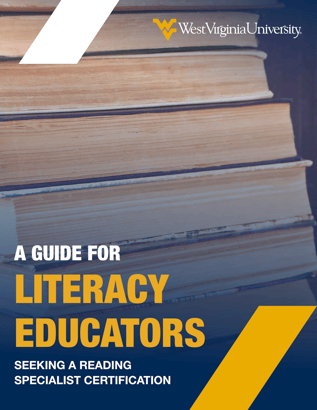
Download the Guide
WVU’s Master of Arts
in Literacy Education
West Virginia University’s College of Education and Human Services offers a Master of Arts in Literacy Education, formerly known as Reading. The Literacy Education (LE) program is an advanced certification and master’s degree program that leads to pre-K through adult learning reading specialist certification in the state of West Virginia. Accredited by the Council for the Accreditation of Education Preparation (CAEP), this graduate degree is designed for candidates who hold a valid teaching license and who are seeking to add a renowned Reading Specialist certification to their current achievements.

Vision
To prepare specialized literacy professionals to serve as literacy leaders and practitioners who will work collaboratively to provide all children access to high-quality literacy instruction and equitable access to student-centered and developmentally-appropriate, diverse literacy-rich learning environments.

Mission
The mission of the Literacy Education program at West Virginia University is to offer sound, accessible and advanced professional preparation for PK-12 teachers at the graduate level in the area of literacy (reading, writing, speaking, listening, viewing) in order to positively impact PK-12 learning for all students.
WVU’s Literacy Education program is the only LE master’s degree program for Reading Specialists in West Virginia that is offered exclusively online. Existing as a separate unit from West Virginia University’s traditional Office of Graduate Admissions and Recruitment, WVU Online is made up of enrollment coaches that assist students from the point of inquiry through what WVU’s Admissions Team considers a “strong start,” which is the first week of classes. The unit also oversees the registration process for many online programs. LE students at WVU are able to complete their graduate degree and certification from anywhere in the country, making it a perfect option for nontraditional students and working educators.
Further, the instructional design of the Literacy Education program is grounded in the WVU Online Conceptual Model. This model aligns the Community of Inquiry model (Garrison, Anderson, & Archer, 2000) with what is known about effective professional learning opportunities for in-service educators.
National Recognition
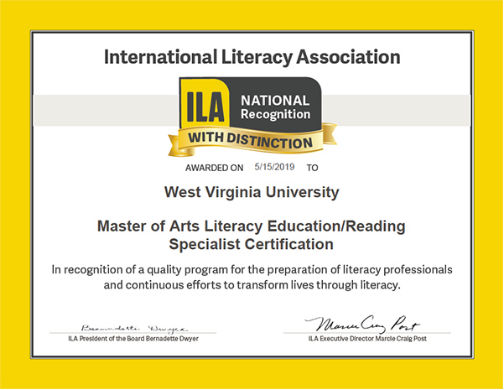
Note: In Spring 2019, West Virginia University’s Literacy Education graduate program was awarded the International Literacy Association Certificate for Distinction for the Preparation of Literacy Professionals (ILA CoD).
This renowned Certificate of Distinction recognizes outstanding licensure, certificate, and endorsement programs that prepare reading and literacy specialists. Earning an ILA CoD demonstrates that West Virginia University’s M.A. in Literacy Education adheres to a rigorous set of standards, setting it apart from similar programs. Including WVU, there were only six CAEP programs invited to apply for this prestigious award.
L.E. Curriculum and Coursework
Through the program’s newly revised curriculum, candidates are required to register for and complete nine required courses and one elective, totaling 30 credit hours. While the LE program formerly offered 16-week courses by which students could complete the degree and certification, beginning Fall 2019, the program will operate on a model that offers eight-week courses excluding two practicum courses that will remain 16-week courses. Students are advised to complete six credits a semester — in other words, taking one eight-week course followed by another eight-week course. Because the two 16-week practicum courses require LE students to work with existing reading specialists in an in-person school setting, these courses are not offered during the summer. The nine required courses and elective options can be seen below.
LE 603: Children’s Literature
LE 603: Children’s Literature
This course provides information about different genres, topics, and aspects of children's literature in the elementary classroom.
LE 620: Specialized Literacy Professionals
LE 620: Specialized Literacy Professionals
This course investigates the history of the role of the reading specialist, adult learning theory, coaching. collaboration, professional standards, and contemporary research on specialized literacy professionals.
LE 621: Knowledge of Literacy Instruction
LE 621: Knowledge of Literacy Instruction
This course targets the following aspects of the reading process: phonemic awareness, word study (phonics and vocabulary), fluency, and comprehension and develops content, pedagogical and curricular knowledge along developmental continuums of learning.
LE 622: Content and Disciplinary Literacy Instruction
LE 622: Content and Disciplinary Literacy Instruction
This course targets comprehension, vocabulary and writing instruction and examines ways in which they may be developed in the K-12 disciplines including science, social studies, math, and English language arts.
LE 623: Early Literacy Instruction
LE 623: Early Literacy Instruction
This course focuses on young learner's oral language, reading and writing development and instructional approaches for fostering growth at home and in preschool and kindergarten classrooms.
LE 624: Foundations of Literacy
LE 624: Foundations of Literacy
This course explores the relationship between theoretical, conceptual, historical, con- temporary and evidence-based foundations of literacy and language (reading, writing, and oral language).
LE 627: Motivation and Engagement in Literacy Learning
LE 627: Motivation and Engagement in Literacy Learning
Reading, writing, and technology are examined through theoretical constructs of learner motivation and engagement in this course.
LE 640: Literacy Intervention
LE 640: Literacy Intervention
This course emphasizes a learner-centered approach to literacy instruction. It focuses on how to effectively plan for developmentally appropriate differentiated literacy instruction for all students and specifically addresses student learning needs when reading difficulties arise. Candidates provide individualized instruction to a diverse learner who struggles and have opportunities to provide peer feedback in this course.
LE 682: Literacy Assessments
LE 682: Literacy Assessments
This course focuses on foundational knowledge, purposes, terminology, and analysis procedures associated with formal and informal literacy assessments.
LE 689: Literacy Intervention II
LE 689: Literacy Intervention II
This practical experience provides literacy education candidates’ opportunities to apply learner-centered concepts to small group teaching contexts. Candidates plan for and provide developmentally appropriate literacy instruction with small groups of diverse students and provide instructional feedback to peers.
LE 726: Literacy Leadership
LE 726: Literacy Leadership
EXPERT FACULTY AND INSTRUCTORS
For the past several years (2016-present), the Literacy Education program has functioned with two full-time, tenured faculty members, Allison Dagen (PhD) and Aimee Morewood (PhD), as well as multiple adjunct instructors. Both Dagen and Morewood hold Memorandums of Understanding (MoU) status, have published research, engage in national leadership, and at the state level, are participating members of the Leaders of Literacy, a consortium of statewide higher education faculty.
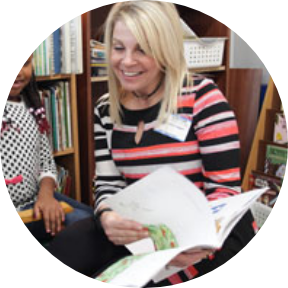
Allison Dagen, promoted to full professor in 2018, has been engaged with accreditation work with the ILA since the start of the tenure at WVU (2002). This service-based scholarship work led to a nomination to the ILA 2017 Standards Committee where Dagen served as the lead writer for Standard 5. Dagen is currently co-editing the second edition of Best Practices for Literacy Leaders (Guilford Publications). Her most recent publication appeared in the Elementary School Journal and focused on principals’ perceptions of the roles and responsibilities of specialized literacy professionals. Dagen has been the recipient of the CEHS Outstanding Researcher award (2009) and the Laddie Bell Service award (2018). Within the LE program, Dagen serves at the Program Coordinator with responsibilities for recruitment, advising, curriculum and accreditation. For the 2018-19 academic year, Dagen was selected as a WVU Provost Academic Leadership Fellow and is currently assigned to the Office of Graduate Education and Life. This position is centered around the graduate curriculum, professional development for graduate students, and financial support for graduate students.
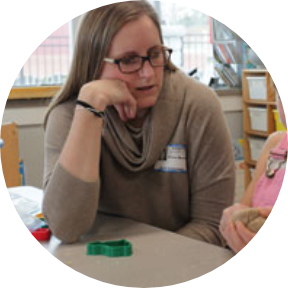
Aimee Morewood was promoted to associate professor in 2013. In 2018, her research was awarded the American Educational Research Association (AERA) Classroom Observation SIG’s Exemplary Paper Award and the Distinguished Education Research Article Award-Honorable Mention by the Journal of Research in Childhood Education. Within the Literacy Education program, Morewood serves at the Outreach Coordinator, where she creates partnership opportunities with local schools and across the University campus. As the lead faculty in the program’s shift to a 100% online modality, Morewood has continued to learn about effective instruction by earning additional certificates through Quality Matters and VoiceThread.
In addition to this work, Morewood has taken on the roles of Collaborative Faculty in Residence (2009-2011) (a two-year residency in a local elementary school where she became a part of the school community and lead literacy learning initiatives), a Clinical Practice Fellow (2018) (this fellowship was co-sponsored by the National Association of Professional Development Schools and the Association of Teacher Educators and focused on effective clinical practices in teacher education), and was selected as a 2018 WVU Teaching and Learning Commons Fellow. Through this program, she is able to partner with university colleagues around the topic of the scholarship of teaching and learning. Finally, Morewood is the recipient of the 2019 WVU Digital Learning award, which highlights excellence and innovation implementing digital tools.
L.E. STUDENT SPOTLIGHT

WVU’s Literacy Education program prepared me to impact real tangible change by showing me how to really pick apart different literacy activities to decide if they are really effective.
— Eleni Nardone, Current L.E. Student
Tell me a little bit about yourself. What’s your name, age, and living location?
My name is Eleni Nardone. I am about to turn 25, and I am currently living in Wheeling, WV, which is where I grew up. I graduated with my undergraduate degree from West Virginia University last spring (2018). I graduated with a bachelor’s in Elementary Education.
Are you currently working in an educational setting?
I am currently working as a Title I Mathematics Interventionist at a school in Ohio County called Warwood School. I attended the school I now teach at from 2000-2009 as a student. I am very lucky to have the opportunity to work at the school that made me into who I am today. I work with grades 5th-8th to help students understand and foster a love for mathematics! My role involves co-teaching and pulling small groups to help those who are struggling in math.
Tell me about your experience in WVU’s Literacy Education program? Particularly, why did you choose to pursue this graduate degree in light of your career goals?
My experience in WVU's Literacy Education program has been very positive. I was a little worried going into it that I wouldn't have time for everything (with this being my first year of teaching), but the professors are all extremely understanding and respectful of our time as busy educators. Their sole priority is to make us better teachers by helping to promote a love for literacy and an understanding of the best ways to implement it proficiently in our classrooms. I truly feel that all of my professors in this program greatly care about making our classrooms in West Virginia, and across the country, better.
My long term goal is to get an elementary education job in Ohio County when one becomes available. For this reason, I chose to pursue this graduate degree because I felt that I could grow most in my knowledge of literacy. I have always been most comfortable in mathematics and science, and therefore, really wanted to hone in on what I considered to be one of my weaker areas so that I can be the best that I can be for my students. I passionately feel that this program has helped me immensely in my knowledge of literacy, and I cannot wait until I get the opportunity to teach reading to my students. I no longer would refer to literacy as a weak area, which is all I could have asked for from this program!
List three practical, valuable ways that WVU’s LE program prepared you to impact real, tangible change as a reading specialist.
WVU's Literacy Education program prepared me to impact real tangible change by showing me how to really pick apart different literacy activities to decide if they are really effective. One of my favorite assignments that we did in the program was to find and critique pins on Pinterest. We had to decide if the activity truly taught the "skill" that it was claiming to teach in a practical way.
In addition, I feel that this program has helped me really reflect on my teaching. Through journaling and blogging for the online courses, I can say that I grew as a teacher SO much. I found myself asking: "What did I do well?” and “What could be improved?" each day after teaching. Writing these things down and collaborating with my peers to hear their thoughts has helped me refine and adjust my practices in my classroom.
Last, this class has walked me through so many different reading assessments that I did not have time to fully learn in my undergraduate courses. I now feel confident when thinking about administering these assessments to my students in the future. I think my lack of knowledge in these assessments, especially, was one of my main reasons for enrolling in this program, and I am so glad that I did! I have learned through my experience in mathematics teaching that even in math our students need to know how to read (hello word problems!).
What advice would you give to an aspiring LE student hoping to study at WVU?
Just do it! Don't feel like you won't have enough time or that it will be too much because the professors truly are so great to work with. They really do respect your time and you can work a full-time job and even coach a sport or two and still have time to get everything done! I know this sounds so hard to believe (I wouldn't have believed you either!), but I am living it! So I guess my advice would be don't let the fear of striking out keep you from playing the game (Yes, I just quoted A Cinderella Story, but seriously you will learn so much and it will make you a better teacher. You can do it!).
What advice would you give to an aspiring LE student who is concerned with the idea of enrolling in a 100% online graduate program?
Online classes are amazing! The Literacy Education program contains all of the perks of being a lifelong learner, but you get to do it in your pajamas! I am always busy, so being able to decide which days I want to sit down and work on my classes is such an awesome thing. Online classes offer the most flexible schedule for our busy, educating lives. In addition, the tools that are used in the online classes are really neat! Through the use of webcams, I feel like I know my classmates even though I have never met a lot of them before. I look forward to actually meeting them in person at graduation!
Lastly, tell me about one experience with a professor that really impacted your experience at WVU in a positive way.
Allison Dagen is an amazing leader. When I was thinking about potentially doing this program during my undergraduate degree at WVU, she took time out of her day to meet with another student and me just to talk about any concerns we may have. I could tell, even then, how much she truly cares and how much of herself she has put into this program.
In addition, she taught my mom during her journey to become a Reading Specialist and knew who she was just by looking at me at that very first meeting! I think this says a lot about a Professor, for that was nearly 14 years ago and she still remembered her by name (without me even reminding her!). Moreover, she is always reaching out to her students to help them find scholarships and aid. She will do whatever it takes to help make this program a positive experience for all of her students.
Read More
Read Less
Joining the L.E. Community at WVU
It’s exciting that you’re passionate about the field of education and that you’re considering honing your skills by pursuing the Master of Arts in Literary Education with Reading Specialist Certification at West Virginia University. West Virginia University has identified five core values — Service, Curiosity, Respect, Accountability, and Appreciation — to guide the work of faculty, staff, candidates, and administrators. We’re proud to say that these values support the mission and vision of the LE program. If you have questions about this graduate degree or about the graduate school admissions process, we invite you to visit our website for more information!
Financing Your L.E. Degree
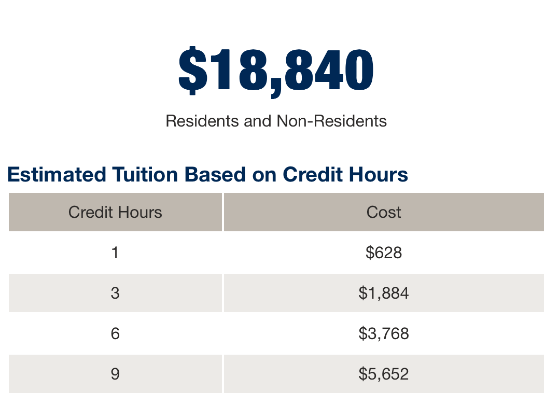
Note: The Master of Arts in Literacy Education requires 30 credit hours to complete, and the cost per credit hour is $629. Upon completion of the program, the total cost for residents and non-residents alike is $18,840.
While WVU’s graduate students are eligible to apply for financial aid through the WVU Office of Financial Aid and are encouraged to file a Free Application for Federal Student Aid (FAFSA) form, many candidates considering the graduate Literacy Education degree are unaware of two incredibly valuable financial aid options.
The Federal Teacher Assistance for College and Higher Education Grant — The Federal TEACH Grant may be a great option for students pursuing both a degree and a certification. Applicants must serve as a full-time teacher
(cannot be a substitute teacher) at a school that services low-income students. Students must also submit the FAFSA form prior to applying for the Teach Grant.
Underwood-Smith Teacher Scholarship Loan Assistance Program — This particular Loan Assistance Program is limited to teachers who have earned a teaching degree and who is certified to teach in West Virginia. Each eligible teacher must enter into an agreement to teach full-time in a public school in West Virginia in a subject area or regional area of critical need under contract with a county board for a period of two school years.
Connect with Us
The stimulating graduate community of scholar-teachers and passionate learners at West Virginia University is dedicated to creating an environment that welcomes your desire to grow, to learn, and to add to the growing body of knowledge in your field. As a WVU graduate learner, you engage in internationally recognized academic programs and innovative research opportunities, as WVU is one of the 115 institutions in the U.S. classified as R1 by the Carnegie Foundation for the Advancement of Higher Education.
We hope this resource has been helpful in informing you of the valuable opportunity that comes with pursuing a graduate degree in Literacy Education at West Virginia University. We hope you’ll connect with us soon by requesting more information or by starting your online application today. If you have specific questions about this resource or about the Literacy Education graduate program at WVU, we invite you to connect with the LE Program Coordinator Allison Dagen by phone at (304) 293-4417 or by email at allison.swan@mail.wvu.edu.
WVU Online
West Virginia University
PO Box 6800
Morgantown, WV 26506-6800
Phone: (800) 253-2762
Email: wvuonline@mail.wvu.edu




